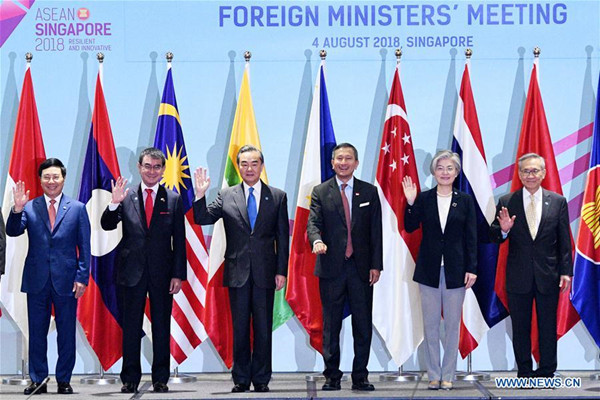
Chinese State Councilor and Foreign Minister Wang Yi (3rd L) poses for a group photo during the foreign ministers' meeting of the 10 member states of the Association of Southeast Asian Nations (ASEAN) and China, Japan and South Korea (10+3) held in Singapore, Aug. 4, 2018. (Xinhua/Then Chih Wey)
Chinese State Councilor and Foreign Minister Wang Yi on Saturday spoke highly of the foreign ministers' meeting of the 10 member states of the Association of Southeast Asian Nations (ASEAN) and China, Japan and South Korea (10+3).
Wang told a press briefing that important consensus has been reached at the 10+3 foreign ministers' meeting, which was held here earlier in the day, and the meeting went smoothly and successfully.
The foreign ministers agreed to jointly uphold free trade, oppose protectionism and stick to the process of multilateralism, he said.
And they also agreed that with the establishment of the ASEAN Community and restoration and growth of the China-Japan-South Korea cooperation, it's high time to positively push for the building of an East Asia economic community, and the negotiations on the Regional Comprehensive Economic Partnership (RCEP) should also be speeded up, according to Wang.
On the foreign ministers' meeting of East Asia Summit, Wang said two major positive developments have been witnessed in the region, noting that the first one is that the Korean Peninsula nuclear issue has returned to the track of settlement through dialogue and consultation.
The second one is that the situation in the South China Sea has further stabilized thanks to the concerted efforts of China and the 10 ASEAN member states, Wang said.
What is more important is that China and ASEAN have arrived at a single draft negotiating text of the Code of Conduct (COC) in the South China Sea, Wang noted.
Meanwhile, there have been two negative trends in the region. The free trade system has been seriously hit by rising unilateralism and protectionism, which threatens the future development of all countries and the well-being of their peoples, he noted.
Another negative trend is that some non-regional countries have become a push for the militarization in the region, which threatens and puts pressure on the security of the countries in the region, including China, Wang said.
The countries in the region have the final say on the current situation and the further cooperation in the region, he said, hoping that the non-regional countries should change their mindsets, and understand and support the positive efforts China and ASEAN have made.

















